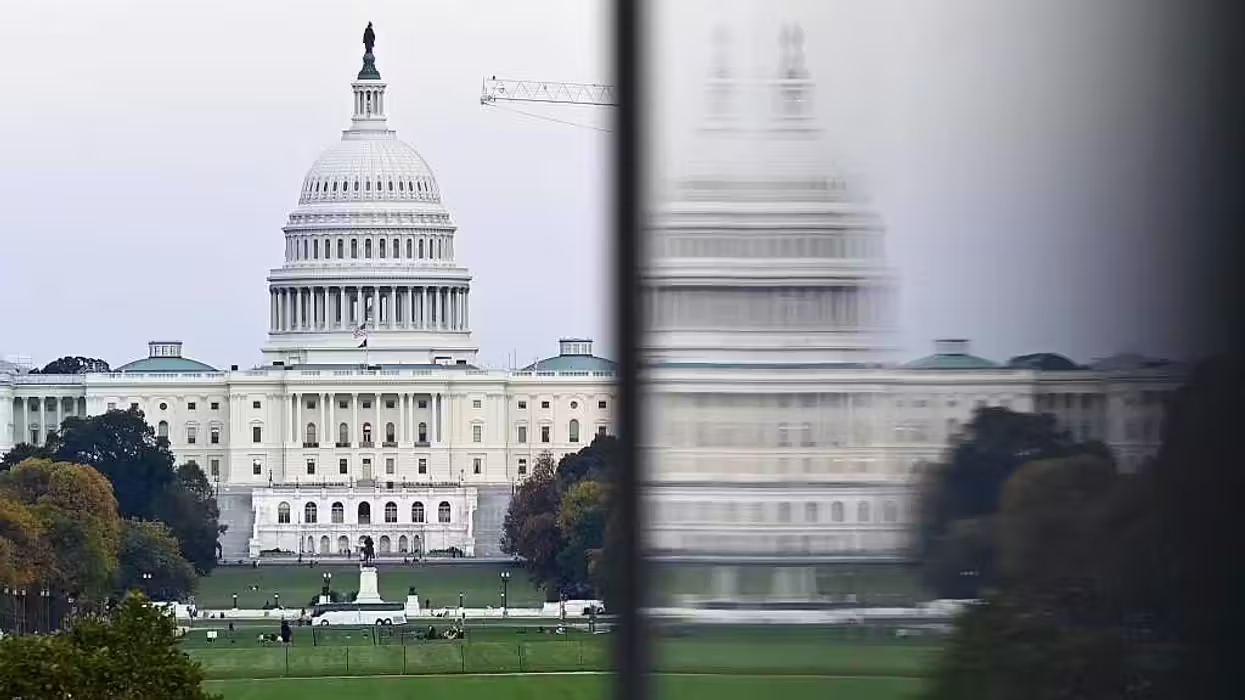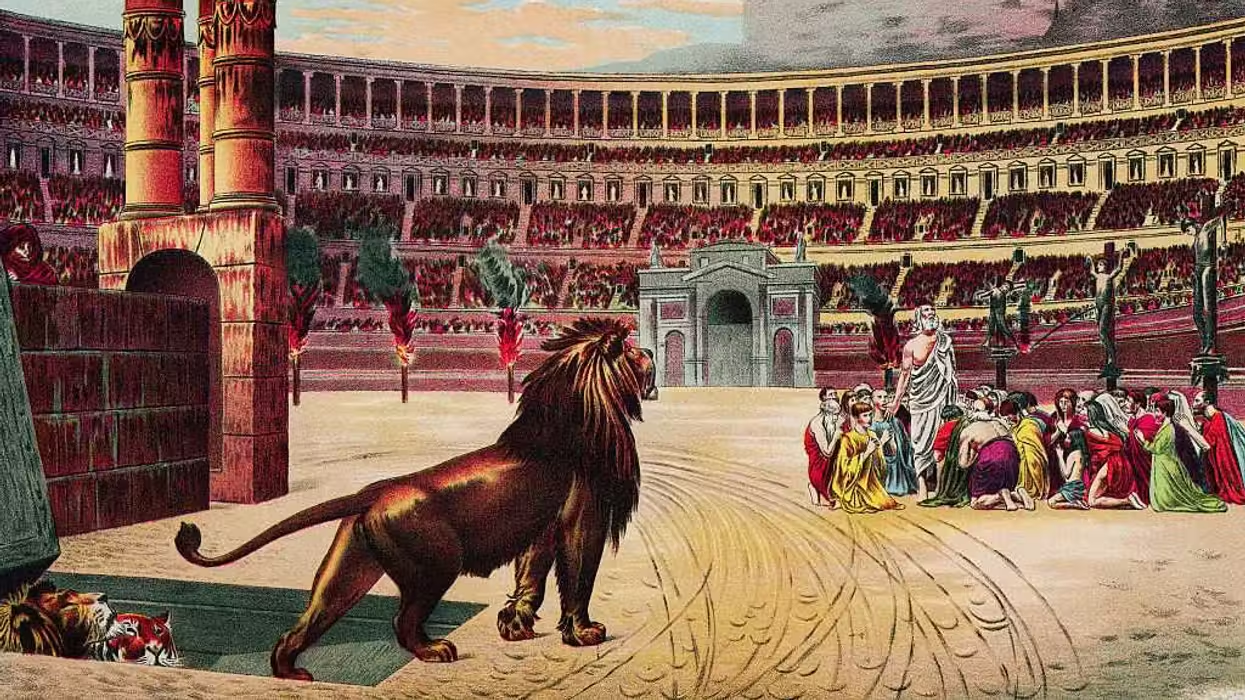During President Obama's address at the Lyndon Baines Johnson Library honoring the 50th Anniversary of President Johnson's signing of the Civil Rights Act, the president praised Johnson, not only in terms of his passing of the Civil Rights Act of 1964, but in fighting for civil rights such as "a decent job, decent wages, health care" -- in other words for the entirety of the Great Society agenda.
Tying this argument into today, Obama cast his opponents in the "debate about equality and opportunity and the role of government in ensuring each" as analogous to those of 50 years ago, who "dismiss the Great Society as a failed experiment and an encroachment on liberty, who argue the government has become the true source of all that ails us and that poverty is due to the moral failings of those who suffer from it."
 President Lyndon B. Johnson meets with Sen. Richard Russell on 17 December, 1963. (Image Source: Wikipedia/Lyndon Baines Johnson Library and Museum. Image Serial Number: W98-30)
President Lyndon B. Johnson meets with Sen. Richard Russell on 17 December, 1963. (Image Source: Wikipedia/Lyndon Baines Johnson Library and Museum. Image Serial Number: W98-30)
One of those Americans who falls into this (minus President Obama's characterization of such people as blaming poverty on the moral failings of the poor themselves), was a Johnson contemporary, Henry Hazlitt.
Hazlitt, a free-market journalist best known for his classic "Economics in One Lesson," wrote an article titled "The Poverty Package" in Newsweek on August 24, 1964, covering just one aspect of Johnson's agenda, "The Economic Opportunity Act of 1964."
The below articles comes from a collection of his Newsweek articles from 1946 to 1966 titled "Business Tides." All emphasis is ours.
The Poverty Package
The anti-poverty law—or the Economic Opportunity Act of 1964, to use its official title—is primarily a Democratic campaign document and a vote-buying device. It is designed to give the impression that for the first time in our history the Federal government has become aware of the existence of poverty and is doing something about it. Actually we have been piling one “anti-poverty” program on top of another since the New Deal began 30 years ago.
[sharequote align="center"]The anti-poverty law...is primarily a Democratic campaign document and a vote-buying device.[/sharequote]
The excellent Republican minority report on the bill to the House listed 42 individual programs “designed to combat and overcome the causes of poverty” already in existence. These programs cost a total of $31.8 billion in the fiscal year 1964. According to the Social Security Bulletin for November 1963, a total of $66.5 billion was spent by all levels of government for “social welfare” purposes in 1962. During the same year, an additional $33.5 billion was spent by private organizations for the same purpose. Compared with this total of $100 billion, the new law’s appropriation of just under $1 billion makes it a merely token (and in no sense new) “war on poverty.”
DUPLICATION
The official title is calculated to give the impression that the new law is just a way of helping people to help themselves. The measure in detail, however, reads like the implementation of Mr. Johnson’s statement in January:
[instory-book ISBN="9781610162036"]
“We are going to try to take all of the money that we think is unnecessarily being spent and take it from the ‘haves’ and give it to the ‘have nots’ that need it so much.”
The new law is hard to describe briefly because it is a conglomeration of unrelated programs. The House minority report calls it “a hastily assembled package of odd legislative retreads and rejects, interspersed with a sprinkling of old, unsuccessful experiments and a plagiarized assortment of existing programs.”
Nearly all of the “new” programs duplicate or compete with existing Federal programs. The so-called “Job Corps” providing for work camps will cost $190 million in the first year for only 40,000 enrollees, or
$4,700 per enrollee. The first-year cost of the “work-training” program is another $150 million. Both pro- grams heavily overlap the 1963 Vocational Education Act and the expanded Manpower Act. The $72.5 mil- lion “work-study” program will give more assistance to the very same college students now being aided by the massive student-loan program under the National Defense Education Act. Direct loans to low-income farm families duplicate a huge existing Farmers Home Administration program. Loans under Title IV would duplicate what the Small Business Administration is already doing. And so on.
WELFARE STATISM
The first year’s price tag on this new measure—$947.5 million—is relatively small as current spending goes. But it will carry us a giant step deeper into a paternalistic welfare state. Its ultimate effect will be to create a good deal more poverty than it cures. We can be sure that its cost will increase each year. This cost, if paid for out of bigger taxes, will increase the burdens on private enterprise and the deterrents to production. If it is added to the deficit, it will increase inflation, an invisible but destructive tax with its cruelest impact on the poor.
As the House minority report pointed out, no society in the history of the world has so effectively overcome the cruel grasp of poverty as has the United States.
In terms of a “war against poverty,” the whole history of America has been a history of sustained and spectacular accomplishment. In 1929 (using 1962 dollars as a standard), more than 50 percent of American families had an annual income of less than $3,000. By 1947 this figure had fallen to 30 percent, and by 1962 to 21 percent. In this same period, American families having an annual income of $6,000 or more rose from 15 percent to 48 percent. Americans earn more, own more, consume more, and live better than any other people on earth.
And we have achieved this result, not by government “anti-poverty” programs, of which we have had proportionately less than most nations, but by our system of free, private, competitive enterprise, which provides maximum incentives to production.

 President Lyndon B. Johnson meets with Sen. Richard Russell on 17 December, 1963. (Image Source: Wikipedia/Lyndon Baines Johnson Library and Museum. Image Serial Number: W98-30)
President Lyndon B. Johnson meets with Sen. Richard Russell on 17 December, 1963. (Image Source: Wikipedia/Lyndon Baines Johnson Library and Museum. Image Serial Number: W98-30)





